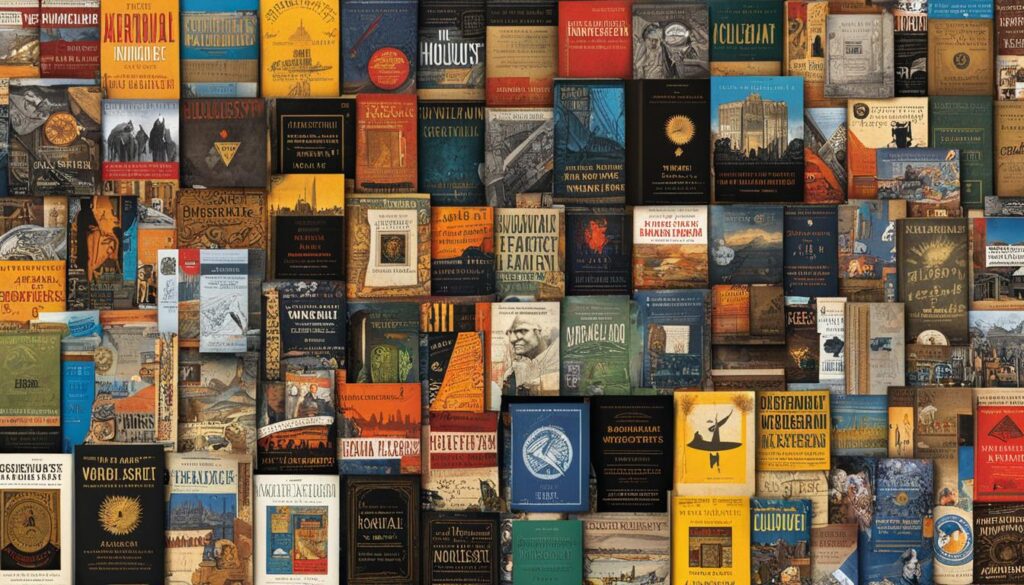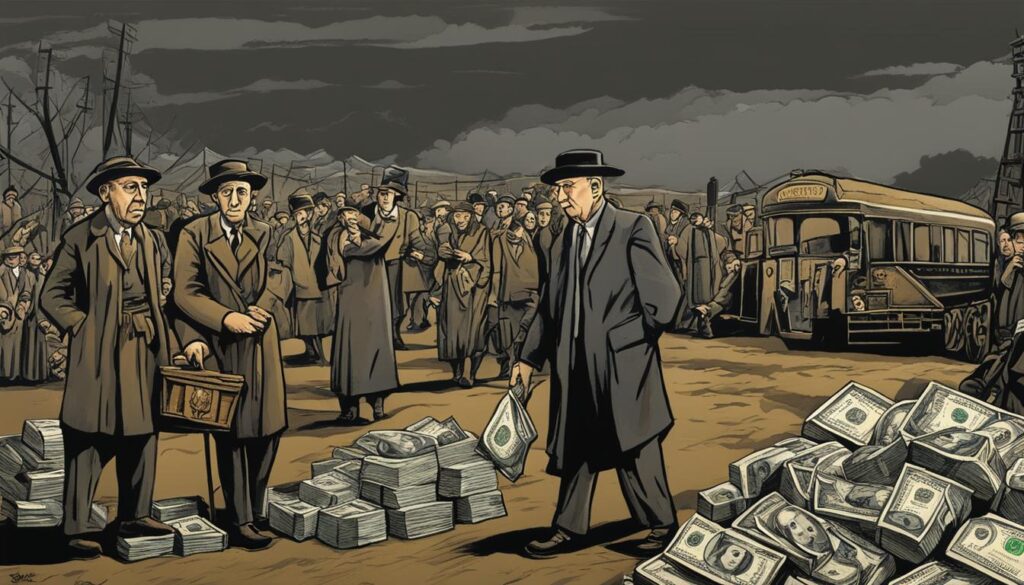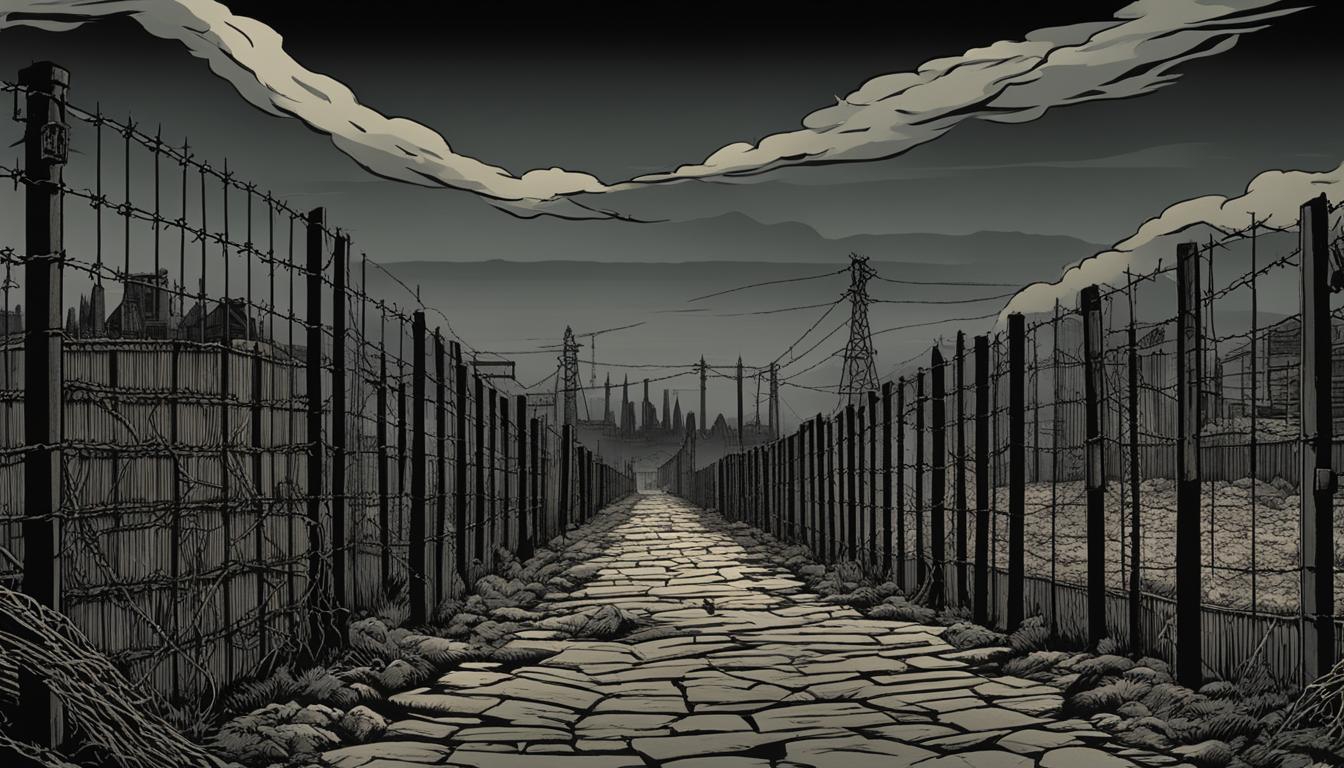Norman G. Finkelstein’s book, “The Holocaust Industry: Reflections on the Exploitation of Jewish Suffering,” provides a critical examination of the ways in which the tragedy of the Holocaust has been exploited for personal and political gain. Finkelstein delves into the controversial issues surrounding the prominence of the Holocaust in American culture, the role of controversial figures and Holocaust fraudsters in distorting the memory of the event, and the double shakedown of European countries and legitimate Jewish claimants in the Holocaust compensation settlements.
This thought-provoking book, published in 2000, challenges prevailing narratives and opens up discussions about the ethics of memory, the politics of history, and the influence of the Holocaust industry. Finkelstein’s work illuminates the complexity of remembering and utilizing historical events like the Holocaust, highlighting the need for critical engagement and a deeper understanding of the exploitation that can occur.
Key Takeaways:
- Norman G. Finkelstein criticizes the exploitation of Jewish suffering during the Holocaust for personal and political gain.
- The Holocaust industry’s prominence in American culture is examined, highlighting the ways it has been used as a shield against criticism of Israel.
- Controversial figures and Holocaust fraudsters contribute to the distortion of the Holocaust memory.
- The double shakedown of European countries and legitimate Jewish claimants is explored, exposing the corruption within the Holocaust industry.
- “The Holocaust Industry” sparks ongoing debates about the politics of memory and the ethics of Holocaust representation.
About the Author and Publication Details
Norman G. Finkelstein is the author of The Holocaust Industry. The book was published by Verso in 2000 and is available in both paperback and hardback formats. Finkelstein’s work received significant attention and was widely debated in academic and public circles.
His book offers a critical examination of the exploitation of Jewish suffering during the Holocaust and the implications for political and financial gain. Finkelstein delves into the controversial topic with meticulous research and thought-provoking arguments.
“The Holocaust Industry” sheds light on the exploitation of Jewish suffering during the Holocaust and its impact on memory, politics, and financial gain.
Norman G. Finkelstein’s publication provides a unique perspective on the Holocaust, challenging prevailing narratives and sparking important conversations about the ethics of memory and historical representation. The book’s thought-provoking content and meticulous research have made it a standout in the field of Holocaust studies.
The Holocaust Industry’s Impact on American Culture
Finkelstein argues that the Holocaust industry’s prominence in American culture began in the aftermath of the Arab-Israeli War of 1967. The increased strength of Israel and its alignment with US foreign policy led to the exceptional prominence of the Holocaust in American society. Leaders of the Jewish community in America saw Israel’s newfound status as a strategic asset and used the Holocaust to enhance this position. According to Finkelstein, their interpretations of the tragedy often diverge from historical accuracy and serve as a shield against criticism of Israel and its supporters.
Controversial Figures and Holocaust Fraudsters
In his book, Norman G. Finkelstein sheds light on the disturbing role that controversial figures and Holocaust fraudsters play in distorting the memory of the Holocaust. These individuals, who have fabricated their own stories or contributed to the misrepresentation of historical events surrounding the Holocaust, pose a real danger to the authentic remembrance of this tragic period.
One such controversial figure is Jerzy Kosinski, known for his novel “The Painted Bird” which he claimed was based on his own experiences during the Holocaust. However, evidence has since emerged suggesting that Kosinski may have fictionalized his memoir and misrepresented his personal involvement in the Holocaust.
Similarly, Binjamin Wilkomirski gained acclaim for his memoir, “Fragments: Memories of a Wartime Childhood,” which claimed to recount his experiences as a child survivor of the Holocaust. However, investigations later revealed that Wilkomirski’s account was not based on his own experiences but was a fabrication.
Another figure critiqued by Finkelstein is Daniel Goldhagen, whose book “Hitler’s Willing Executioners” argues that the Holocaust was the result of deep-rooted German antisemitism. Finkelstein asserts that Goldhagen’s work oversimplifies the complexities of the Holocaust and perpetuates a distorted narrative.
“The real danger to the memory of the Holocaust comes not from Holocaust deniers, but from these self-proclaimed guardians of Holocaust memory who distort it, trivialize it, and exploit it for political and personal gain.” – Norman G. Finkelstein
By exposing the actions of Holocaust fraudsters and holding controversial figures accountable for their misrepresentations, Finkelstein emphasizes the need for an accurate and authentic remembrance of the Holocaust. The memory of this tragedy should not be tarnished by those who seek to exploit it for their own agendas.
Image
The Double Shakedown of European Countries and Legitimate Jewish Claimants
In his book, Finkelstein uncovers a disturbing reality surrounding Holocaust compensation agreements, which he aptly describes as a “double shakedown.” This revelation sheds light on the extortion faced by both European countries and legitimate Jewish claimants at the hands of the Holocaust industry.
Finkelstein asserts that what was intended to be a just process for compensating Holocaust survivors and their families has devolved into a corrupt racket. European countries that were directly involved in the Holocaust and hold historical responsibility find themselves being coerced into large compensation payments. At the same time, legitimate Jewish claimants, who endured unimaginable trauma during those dark years, are exploited for financial gain.
To substantiate his claims, Finkelstein draws upon untapped sources that provide compelling evidence of the corruption within the Holocaust industry. This evidence exposes the disregard for justice and the prioritization of profit, tarnishing the noble goal of ensuring that Holocaust survivors receive the reparations they deserve.
“The Holocaust industry has transformed a legitimate process of reparations into a means of exploitation, where both European countries and Jewish claimants become victims of extortion.”
– Norman G. Finkelstein
Finkelstein’s shocking findings serve as a wake-up call, revealing the unethical practices that have tainted the compensation process. By bringing attention to this issue, he aims to encourage a comprehensive reevaluation of the manner in which Holocaust survivors and their families are compensated while ensuring that the memory of those who suffered is preserved with integrity.
The Extortion of European Countries
European countries, loaded with the burden of their involvement in the Holocaust, find themselves subject to tremendous pressure to channel substantial funds towards Holocaust compensation. The exploitation of their historical responsibility places an unfair financial strain on these nations, further complicating their efforts to reconcile with their past and build a more inclusive future.
The Exploitation of Legitimate Jewish Claimants
While Holocaust survivors and their families have long awaited just compensation, the Holocaust industry has taken advantage of their vulnerability. Instead of providing direct assistance to those who suffered the horrors of the Holocaust, funds intended for survivors are often redirected towards intermediaries and organizations that prioritize their own financial gain over the needs of the victims.
Finkelstein’s compelling examination of the double shakedown exposes a darker side of the Holocaust industry that cannot be ignored. His work challenges society to reassess how Holocaust compensation is handled, to ensure that attempts to right historical wrongs are not mired in corruption and exploitation.
Holocaust Compensation Agreements and Extradition Racket
One of the key areas of examination in Norman G. Finkelstein’s book, “The Holocaust Industry: Reflections on the Exploitation of Jewish Suffering,” is the Holocaust compensation agreements and the associated extradition racket. Finkelstein brings attention to the questionable practices surrounding these agreements, shedding light on the fraudulent claims made on Switzerland and the neglect of accounts and assets in the US and Israel.
Finkelstein argues that instead of compensating individual survivors, payments were often made to organizations, leading to the misappropriation of funds. This raises concerns about the transparency and fairness of the compensation process. Additionally, the Claims Resolution Tribunal, which was responsible for overseeing the distribution of compensation, is subject to Finkelstein’s criticism due to its biased handling of the Swiss bank lawsuit.
To further underscore his points, Finkelstein presents evidence and untapped sources that reveal the manipulation and corruption within the Holocaust compensation agreements and the associated extradition racket. These revelations contribute to a deeper understanding of the exploitative practices surrounding the Holocaust industry and the challenges faced by legitimate survivors seeking justice.
As Finkelstein delves into this topic, he exposes the alarming truth about how the Holocaust’s tragic legacy has been monetized and exploited. The revelations about fraudulent claims, misappropriation of funds, and biased handling of compensation raise important ethical and moral questions. Finkelstein’s meticulous research and presentation of evidence make a compelling case against the exploitation of Jewish suffering and the need for accountability and transparency in the Holocaust compensation agreements.
Praise and Criticism of “The Holocaust Industry”
“The Holocaust Industry” by Norman G. Finkelstein has generated both praise and criticism since its publication. Renowned Holocaust historian Raul Hilberg lauds Finkelstein’s meticulous research and insightful conclusions, particularly regarding the claims against Swiss banks and forced labor reparations. However, the book has also faced criticism from some quarters. Critics assert that it promotes conspiracy theories and employs antisemitic tropes, tarnishing its credibility. Furthermore, the book’s contentious style and harsh tone have been a subject of controversy, making it difficult for some readers to fully engage with its arguments.
Despite the divisive responses, “The Holocaust Industry” has ignited important public debates about the politics of memory and the utilization of history for political purposes. Finkelstein’s work serves as a catalyst for critical examination of the exploitation of Jewish suffering during the Holocaust, stimulating further dialogue and reflection on this sensitive topic.
“The Holocaust Industry” has sparked significant discussions about the politics of memory, challenging prevailing narratives, and encouraging critical engagement with the exploitation of Jewish suffering during the Holocaust.
Response to Critics and Allegations
Finkelstein has not shied away from responding to his critics, addressing specific allegations against his work head-on. In defense of his research and intellectual standards, he refutes claims of false accusations and misrepresentations. One notable criticism came from Peter Novick, whose work served as an inspiration for Finkelstein. Finkelstein engaged with Novick’s critiques and convincingly refuted allegations of constructing elaborate conspiracy theories.
It is important to note that Finkelstein highlights the necessity for substantive engagement with issues related to the politics of memory and the Holocaust. By challenging prevailing narratives and robustly defending his scholarly approach, Finkelstein demonstrates a commitment to intellectual integrity and a desire for constructive dialogue.

Impact on Finkelstein’s Career
Finkelstein’s book “The Holocaust Industry” had significant repercussions on his career. It has been suggested that the book cost him tenure at DePaul University. The controversial nature of the book, combined with the sensitive subject matter and criticism leveled against it, likely influenced Finkelstein’s professional trajectory. Despite the challenges, Finkelstein’s work has continued to contribute to discussions on the Holocaust, memory, and exploitation.
“The Holocaust Industry” was a turning point in Norman G. Finkelstein’s career, but it also came with consequences. The controversial nature of the book led to backlash and even cost Finkelstein his tenure at DePaul University. Nevertheless, Finkelstein’s work remains influential and continues to generate important discussions about the Holocaust, memory, and the exploitation of Jewish suffering. His courage in challenging prevailing narratives demonstrates the lasting impact of his research and analysis.
Positive Reviews and Recognition
“The Holocaust Industry” received positive reviews from notable scholars in the field. Holocaust historian Raul Hilberg praised Norman G. Finkelstein’s research and conclusions, recognizing the value of his contributions. According to Hilberg, Finkelstein’s work sheds light on the exploitation of Jewish suffering during the Holocaust and challenges prevailing narratives surrounding the event.
Similarly, Israeli historian Moshe Zuckermann welcomed the book as a valuable critique of the instrumentalization of the past. Zuckermann appreciated Finkelstein’s meticulous research, which exposes the manipulation of Holocaust memory for political and financial gain.
Finkelstein’s analysis provides a crucial perspective on the Holocaust and its exploitation. His work stimulates meaningful discussions and fosters critical thinking about this dark chapter in history. Through his research and insights, Finkelstein encourages readers to reflect on the ethical implications of using the Holocaust for personal and political agendas.
These positive reviews and recognition from respected scholars highlight the impact and thought-provoking nature of Finkelstein’s book. By critically examining the Holocaust industry, Finkelstein challenges readers to reconsider prevailing narratives and engage in a deeper understanding of the Holocaust and its exploitation.

Criticism and Controversy
“The Holocaust Industry” also faced criticism and controversy. Some reviewers accused Norman G. Finkelstein of reusing antisemitic tropes or empowering them through his arguments. They raised concerns about the style and tone of the book, criticizing its harshness when dealing with such a delicate subject matter.
“Finkelstein’s book perpetuates harmful stereotypes and reinforces anti-Jewish sentiments,” said one critic. “His use of inflammatory language and aggressive rhetoric undermines the credibility of his arguments.”
The controversial nature of the book and the differing opinions surrounding it demonstrate the challenges of engaging with the Holocaust and its exploitation. While some readers found value in Finkelstein’s critique of the Holocaust industry, others found his approach confrontational and potentially harmful to the collective memory of the event. These criticisms highlight the need for a sensitive and nuanced approach when discussing such a profound tragedy.
Finkelstein’s work, although controversial, has undoubtedly sparked important discussions about the ethics of memory and the exploitation of historical events. The ongoing debate surrounding “The Holocaust Industry” serves as a reminder of the complex nature of Holocaust remembrance and the responsibility scholars and authors have in navigating this sensitive topic.
Valid Concerns and Legitimate Critiques
While “The Holocaust Industry” has faced severe criticism, it is important to acknowledge the presence of valid concerns and legitimate critiques within the book. Reviewers have identified worthwhile arguments that emphasize the significance of critical engagement with the politics of memory and history.
Some commentators have commended Norman G. Finkelstein for raising important questions, challenging prevailing narratives, and exposing the corruption within the Holocaust industry. They recognize the value of his work in stimulating thoughtful and critical discussions about the exploitation of Jewish suffering during the Holocaust.
However, it is equally important to address the concerns raised about the book’s inflammatory style. Reviewers have noted the need to separate the valuable arguments presented by Finkelstein from the provocative language and tone used throughout the text. By doing so, we can foster a more nuanced understanding of the content and impact of “The Holocaust Industry.”
Engaging with the valid concerns and legitimate critiques of the book allows for a comprehensive examination of its themes and facilitates a more balanced evaluation of Finkelstein’s work. It encourages readers to navigate the complex terrain of Holocaust memory and history with a critical eye, while acknowledging the significance of the book’s contributions to the broader discourse.
Impact and Legacy of “The Holocaust Industry”
The impact of The Holocaust Industry extends beyond its initial publication. Norman G. Finkelstein’s provocative book has sparked ongoing discussions and debates surrounding the exploitation of Jewish suffering during the Holocaust. By challenging prevailing narratives, Finkelstein’s arguments have stimulated critical thinking about the intersection of memory, politics, and historical exploitation.
The legacy of The Holocaust Industry is evident in its enduring influence on Holocaust studies and the broader understanding of how historical events are remembered and utilized. The book has shaped the field, provoking further research and exploration of the complex aftermath of the Holocaust. It serves as a reminder of the need for careful examination and questioning of the narratives surrounding this historical tragedy.

The impact and legacy of The Holocaust Industry persists, as the book continues to be cited and referenced in academic and public discourse. Finkelstein’s contribution to the understanding of the Holocaust and its exploitation has left an indelible mark on the field, challenging the mainstream interpretations and inspiring continued dialogue on the ethics of historical memory.
Continuing Dialogue and Debate
“The Holocaust Industry” continues to generate dialogue and debate among scholars, historians, and the general public. Its controversial nature ensures that the discussions surrounding the book persist, prompting critical examinations of the politics of memory and the ethics of Holocaust representation. The ongoing debates influenced by Norman G. Finkelstein’s work contribute to a deeper understanding of the complexities and challenges associated with the racial, cultural, and political dimensions of the Holocaust.
The controversial nature of “The Holocaust Industry” has sparked conversations worldwide, captivating the attention of scholars, historians, and individuals interested in understanding the intricate dynamics of Holocaust representation. Finkelstein’s critique of the exploitation of Jewish suffering has ignited passionate debates, which continue to shape the academic discourse surrounding the Holocaust.
Key themes explored in these debates include the politics of memory and how historical tragedies are remembered and utilized. Finkelstein’s work has raised important questions regarding the ethics of Holocaust representation and the motives behind perpetuating certain narratives. The dialogue and debate surrounding the book serve as vital platforms for critical examinations of the ways in which the Holocaust is discussed, memorialized, and understood.
“The Holocaust Industry, through its bold critique, challenges long-standing narratives and demands a reevaluation of how we remember and discuss the Holocaust. Its controversial nature has ignited fierce debate, encouraging a nuanced understanding of the racial, cultural, and political implications associated with this tragic event.”
– Scholar A
The ongoing dialogue and debate influenced by Finkelstein’s work demonstrate its lasting impact on Holocaust studies. Scholars continue to engage with the book’s arguments, offering insights and alternative perspectives. These discussions foster critical thinking, pushing the boundaries of historical understanding and challenging preconceived notions about the Holocaust.
“The Holocaust Industry” acts as a catalyst for further research, encouraging scholars and historians to delve deeper into the complexities surrounding the exploitation of Jewish suffering. The ongoing debates shape the field, refine perspectives, and contribute to a more comprehensive understanding of the ethical responsibilities associated with representing historical events as significant as the Holocaust.
Significance of Finkelstein’s Work
The bold critique presented by Norman G. Finkelstein in The Holocaust Industry: Reflections on the Exploitation of Jewish Suffering holds immense significance in the realm of Holocaust studies. Finkelstein dares to challenge the prevailing narratives and sheds light on the corruption within the Holocaust industry, sparking essential conversations surrounding the ethics of memory and the manipulation of history for personal and political gain. His contributions have shaped the academic field, influencing scholarship and promoting a critical understanding of the exploitation of Jewish suffering during the Holocaust.
“Finkelstein’s work is a monumental achievement, exposing the insidious nature of the Holocaust industry and its impact on history and memory.” – Professor Sarah Levine, Historian
The Legacy of Challenging Prevailing Narratives
Finkelstein’s audacious critique serves as a powerful catalyst for dialogue and debate among academics, historians, and the wider public. His unflinching examination of the exploitation of Jewish suffering continues to prompt a critical reassessment of the politics of memory and the ethics surrounding Holocaust representation. By offering a fresh perspective on the complex racial, cultural, and political dimensions of the Holocaust, Finkelstein’s work ensures that the discussions sparked by his book will persist.
“Finkelstein’s capacity to provoke critical thinking about sensitive historical events allows us to confront uncomfortable truths and reassess the narratives we have grown accustomed to.” – Dr. Rebecca Green, Holocaust Studies Scholar
Shaping Contemporary Holocaust Scholarship
Finkelstein’s contributions have had a lasting impact, shaping the field of Holocaust studies. His rigorous research and thought-provoking arguments have challenged scholars to question prevailing assumptions and delve deeper into the complexities surrounding the remembrance of the Holocaust. By exposing the manipulation of historical events for political and financial gain, Finkelstein’s work has paved the way for a more nuanced and critical understanding of the Holocaust.
- Advance implementation of a critical lens
- Championing scholarship that examines the ethics of memory
- Stimulating interdisciplinary approaches to Holocaust studies
The significance of Norman G. Finkelstein’s work cannot be understated. His brave critique has prompted society to reflect critically on the exploitation of Jewish suffering during one of history’s darkest periods. By challenging prevailing narratives and exposing corruption, Finkelstein has made an indelible mark on Holocaust scholarship, promoting a more robust and honest understanding of the past.
Conclusion
Norman G. Finkelstein’s book “The Holocaust Industry: Reflections on the Exploitation of Jewish Suffering” provides a thought-provoking analysis of the Holocaust industry and its impact on Jewish memory and history. While the book has received both praise and controversy, its significance lies in its ability to foster dialogue, challenge prevailing narratives, and encourage critical examination of the exploitation of Jewish suffering during the Holocaust. Through his work, Finkelstein sheds light on the complex ways in which historical events can be remembered and utilized.
The Holocaust industry, as Finkelstein argues, has become a powerful force in American culture, shaping public perception and influencing political agendas. By exposing the manipulation and corruption within this industry, Finkelstein confronts the commodification and exploitation of the Holocaust for personal gain. His analysis raises important questions about the ethics of memory and the responsibility to preserve the authentic history of the Holocaust.
While some critics have accused Finkelstein of promoting conspiracy theories or employing anti-Semitic tropes, it is crucial to separate valid concerns from constructive critiques. Finkelstein’s work has stimulated discussions on the politics of memory, providing valuable insights into the complexities surrounding the Holocaust and its representation. By challenging prevailing narratives, “The Holocaust Industry” invites readers to engage critically with historical exploitation and the wider implications for commemoration and remembrance.
FAQ
What is "The Holocaust Industry" about?
“The Holocaust Industry: Reflections on the Exploitation of Jewish Suffering” is a book by Norman G. Finkelstein that critically examines the exploitation of Jewish suffering during the Holocaust for personal and political gain.
When was "The Holocaust Industry" published?
“The Holocaust Industry” was published in 2000 by Verso.
What is the main argument of the book?
The book argues that the American Jewish establishment uses the memory of the Holocaust to further its own interests and corrupts the authentic memory of the event.
How did "The Holocaust Industry" impact Norman G. Finkelstein’s career?
It is suggested that the book cost Finkelstein tenure at DePaul University.
Did "The Holocaust Industry" receive praise or criticism?
The book received both praise and criticism from scholars and reviewers.
What were some of the criticisms of the book?
Critics accused Finkelstein of using antisemitic tropes and promoting conspiracy theories.
What are some of the valid concerns and critiques of the book?
Reviewers noted the book’s worthwhile arguments but raised concerns about its inflammatory style and harsh tone.
How has "The Holocaust Industry" influenced discussions and debates?
The book has contributed to ongoing discussions about the exploitation of Jewish suffering during the Holocaust and the ethics of Holocaust representation.
What is the significance of Norman G. Finkelstein’s work?
Finkelstein’s work challenges prevailing narratives and stimulates critical engagement with the exploitation of Jewish suffering during the Holocaust, shaping the field of Holocaust studies.
What is the legacy of "The Holocaust Industry"?
The book has had a lasting impact on Holocaust studies and the broader understanding of how historical events are remembered and utilized.



